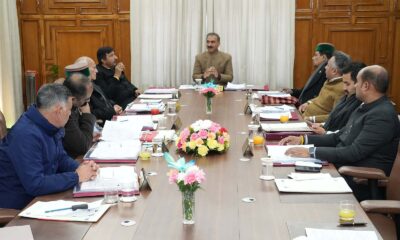Nation
List of Government’s Revised “Lockdown Guidelines”: Know What’s Permitted, What’s Not
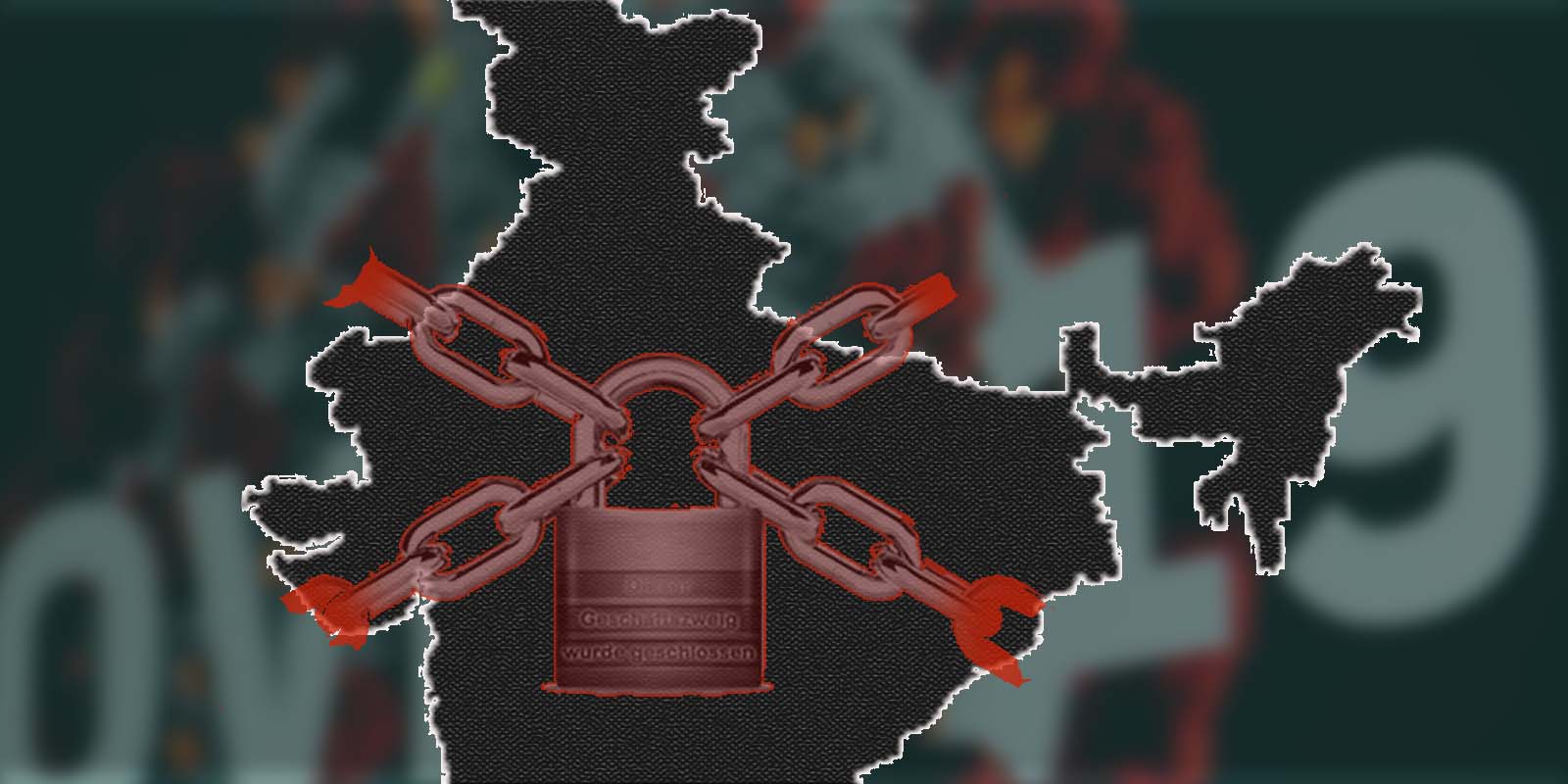
New Delhi-Government of India issued an Order on 14th April 2020 that the lockdown measures stipulated in the Consolidated Guidelines of Union Ministry of Home Affairs (MHA) for containment of COVID-19 epidemic in the country, will continue to remain in force upto 3rd May 2020.
In pursuance of the above-said order of Government of India, MHA has issued consolidated revised guidelines regarding lockdown measures to be taken by Ministries/Departments of Government of India, State/UT Governments for containment of COVID-19 epidemic in the country. The guidelines also prescribe National Directives for COVID-19 management; SOPs for Social Distancing at offices, workplaces, factories and establishments; and, penalties for offences regarding violation of lockdown measures under relevant sections of Disaster Management Act 2005 and IPC, 1860.
MHA has directed all the Ministries/Departments of Government of India and State Governments /Union Territory Administrations for the strict implementation of enclosed consolidated revised guidelines.
Note: Below Given Document has not been edited by Himachal Watcher. It was published as it was received from by the Union Government.
List of Services to Remain Prohibited During Lockdown
With the extension of the lockdown period, the following activities will continue to remain prohibited across the country until 3rd May 2020:
- All domestic and international air travel of passengers, except for purposes enumerated in para 4 (ix), and for security purposes.
- All passenger movement by trains, except for security purposes.
- Buses for public transport.
- Metro rail services.
- Inter-district and inter-State movement of individuals except for medical reasons or for activities permitted under these guidelines.
- All educational, training, coaching institutions etc. shall remain closed.
- All industrial and commercial activities other than those specifically permitted
under these guidelines. - Hospitality services other than those specifically permitted under these guidlines
- Taxis (including auto-rickshaws and cycle rickshaws) and services of cab
- All cinema halls, malls, shopping complexes, gymnasiums, sports complexes, swimming pools, entertainment parks, theatres, bars and auditoriums, assembly halls and similar places.
- All social/ political/ sports/ entertainment/ academic/ cultural/ religious
functions/ other gatherings. - All religious places/ places of worship shall be closed for public. Religious
congregations are strictly prohibited. - In case of funerals, congregation of more than twenty persons will not be
Operation of guidelines in Hotspots and containment zones
- `Hotspots’, areas of large COVID-19 outbreaks, or clusters with significant spread of COVID-19, will be determined as per the guidelines issued by Ministry of Health and Family Welfare (MoHFW), Government of India (Gal).
- In these hotspots, containment zones will be demarcated by States/ UTs/ District administrations as per the guidelines of MoHFW.
- In these containment zones, the activities allowed under these guidelines will not be permitted. There shall be strict perimeter control in the area of the containment zones to ensure that there is no unchecked inward/ outward movement of population from these zones except for maintaining essential services (including medical emergencies and law and order related duties) and Government business continuity. The guidelines issued in this regard by MoHFW will be strictly implemented by State/ UT Governments and the local district authorities.
Services Permitted
Selected permitted activities allowed with effect from 20th April, 2020:
To mitigate hardship to the public, select additional activities have been allowed which will come into effect from 20th April, 2020. These limited exemptions will be operationalized by States/ UTs/ district administrations based on strict compliance to the existing guidelines. Also, before allowing these select additional activities. States/ UTs/ district administrations shall ensure that all preparatory arrangements with regard to the Standard Operating Procedures (SOPs) for social distancing in offices, workplaces, factories and establishments, as also other sectoral requirements are in place.
The consolidated revised guidelines incorporating these select permitted activities have been enumerated in paras 5-20 below.
Strict enforcement of the lockdown guidelines
State/ UT Governments shall not dilute these guidelines issued under the Disaster Management Act, 2005, in any manner, and shall strictly enforce the samee.
State/ UT Governments, may, however, impose stricter measures than these guidelines as per requirement of the local areas.
All health services (including AYUSH) to remain functional, such as:
- Hospitals, nursing homes, clinics, telemedicine facilities.
- Dispensaries, chemists, pharmacies, all kinds of medicine shops including Jan Aushadhi Kendras and medical equipment shops.
- Medical laboratories and collection centres.
- Pharmaceutical and medical research labs, institutions carrying out COVI 0-19 related research.
- Veterinary Hospitals, dispensaries, clinics, pathology labs, sale and supply of vaccine and medicine.
- Authorised private establishments, which support the provisioning of essential services, or efforts for containment of COVID-19, including home care providers, diagnostics, supply chain firms serving hospitals.
- Manufacturing units of drugs, pharmaceuticals, medical devices, medical oxygen, their packaging material, raw material and intermediates.
- Construction of medical/ health infrastructure including manufacture of ambulances.
- Movement (inter and intra State, including by air) of all medical and veterinary personnel, scientists, nurses, para-medical staff, lab technicians, midwives and other hospital support services, including ambulances.
Agricultural and related activities:
All agricultural and horticultural activities to remain fully functional, such as:
- Farming operations by farmers and farm workers in field.
- Agencies engaged in procurement of agriculture products, including MSP operations.
- ‘Mandis’ operated by the Agriculture Produce Market Committee (APMC) or as notified by the State/ UT Government (e.g., satellite mandis).
- Direct marketing operations by the State/ UT Government or by industry directly from farmers/ group of farmers, FPOs’ co-operatives etc. States/ UTs may promote decentralized marketing and procurement at village level.
- Shops of agriculture machinery, its spare parts (including its supply chain) and repairs to remain open.
- ‘Custom Hiring Centres (CHC)’ related to farm machinery.
- Manufacturing, distribution and retail of fertilizers, pesticides and seeds.
- Movement (inter and Intra State) of harvesting and sowing related machines like combined harvester and other agriculture/ horticulture implements.
Fisheries – the following activities will be functional:
- Operations of the fishing (marine and inland)/ aquaculture industry, including feeding & maintenance, harvesting, processing, packaging, cold chain, sale and marketing.
- Hatcheries, feed plants, commercial aquaria.
- Movement of fish/ shrimp and fish products, fish seed/ feed and workers for all these activities.
Plantations- the following activities will be functional:
Operations of tea, coffee and rubber plantations, with maximum of 50% of workers
Processing, packaging, sale and marketing of tea, coffee, rubber and cashew, with maximum of 50% workers.
Animal husbandry — the following activities will be functional:
Collection, processing, distribution and sale of milk and milk products by milk processing plants, including transport and supply chain.
- Operation of animal husbandry farms including poultry farms & hatcheries and livestock farming activity.
- Animal feed manufacturing and feed plants, including supply of raw material, such as maize and soya.
- Operation of animal shelter homes
Financial sector: following to remain functional:
- Reserve Bank of India (RBI) and RBI regulated financial markets and entities
- like NPCI, CCIL, payment system operators and standalone primary dealers.
- Bank branches and ATMs, IT vendors for banking operations, Banking
- Correspondents (BCs), ATM operation and cash management agencies.
- Bank branches be allowed to work as per normal working hours till disbursal of DBT cash transfers is complete.
- Local administration to provide adequate security personnel at bank branches and BCs to maintain social distancing. law and order and staggering of account holders.
- SEBI, and capital and debt market services as notified by the Securities and
- Exchange Board of India (SEBI).
- IRDAI and Insurance companies.
Social sector: following to remain functional:
- Operation of homes for children/ disabled/ mentally challenged/ seniorcitizens/ destitutes/ women/ widows.
- Observation homes, after care homes and places of safety for juveniles.
- Disbursement of social security pensions, e.g., old age/ widow/ freedom fighter pensions; pension and provident fund services provided by Employees Provident Fund Organisation (EPFO).
- Operation of Anganwadis — distribution of food items and nutrition once in 15 days at the doorsteps of beneficiaries, e.g., children, women and lactating mothers.
Online teaching/ distance learning to be encouraged:
- All educational, training, coaching institutions etc. shall remain closed.
- However, these establishments are expected to maintain the academic schedule through online teaching.
- Maximum use of Doordarshan (DD) and other educational channels may be made for teaching purposes.
MNREGA works to be allowed:
- MNREGA works are allowed with strict implementation of social distancing and face mask.
- Priority to be given under MNREGA to irrigation and water conservation works.
- Other Central and State sector schemes in irrigation and water conservation sectors may also be allowed to be implemented and suitably dovetailed with MNREGA works.
Public utilities: following to remain functional:
- Operations of Oil and Gas sector, including refining, transportation, distribution, storage and retail of products, e.g., petrol, diesel, kerosene, CNG, LPG, PNG etc.
- Generation, transmission and distribution of power at Central and State/ UT
- Postal services, including post offices.
- Operations of utilities in water, sanitation and waste management sectors, at municipal/ local body levels in States and UTs.
- Operation of utilities providing telecommunications and Internet services.
Movement, loading/ unloading of goods/ cargo (inter and intra State) is allowed, as under:
- All goods traffic will be allowed to ply.
- Operations of Railways: Transportation of goods and parcel trains.
- Operations of Airports and related facilities for air transport for cargo movement, relief and evacuation.
- Operations of Seaports and Inland Container Depots (ICDs) for cargo transport, including authorized custom clearing and forwarding agents.
- Operations of Land Ports for cross land border transportation of essential goods, including petroleum products and LPG, food products, medical
- Movement of all trucks and other goods/ carrier vehicles with two drivers and one helper subject to the driver carrying a valid driving license; an empty truck/ vehicle will be allowed to ply after the delivery of goods, or for pick up of Shops for truck repairs and dhabas on highways, with a stipulated minimum distance as prescribed by the State/ UT authorities.
- Movement of staff and contractual labour for operations of railways, airports/ air carriers, seaports/ ships/ vessels.
- Landports and ICDs is allowed on passes being issued by the local authority on the basis of authorizations issued by the respective designated authority of the railways, airports, seaports, landports and 1CDs.
Supply of essential goods is allowed, as under:
- All facilities in the supply chain of essential goods, whether involved in manufacturing, wholesale or retail of such goods through local stores, large brick and mortar stores or e-Commerce companies should be allowed to operate, ensuring strict social distancing without any restriction on their timing of opening and closure.
- Shops (including Kirana and single shops selling essential goods) and carts, including ration shops (under PDS), dealing with food and groceries (for daily use), hygiene items, fruits and vegetables, dairy and milk booths, poultry, meat and fish, animal feed and fodder etc, should be allowed to operate, ensuring strict social distancing without any restriction on their timing of opening and closure.
- District authorities may encourage and facilitate home delivery to minimize the
movement of individuals outside their homes.
Commercial and private establishments, as listed below, will be allowed to operate:
- Print and electronic media including broadcasting, DTH and cable services.
- IT and IT enabled Services, with upto 50% strength.
- Data and call centres for Government activities only.
- Government approved Common Service Centres (CSCs) at Gram Panchayat
- E-commerce companies. Vehicles used by e-commerce operators will be allowed to ply with necessary permissions.
- Courier services.
- Cold storage and warehousing services, including at ports, airports, railway stations, container Depots, individual units and other links in the logistics
- Private security services and facilities management services for maintenance and upkeep of office and residential complexes.
- Hotels, homestays, lodges and motels, which are accommodating tourists and persons stranded due to lockdown, medical and emergency staff, air and sea
- Establishments used/ earmarked for quarantine facilities.
- Services provided by self-employed persons, e.g., electrician, IT repairs, plumbers, motor mechanics, and carpenters.
Industries/ Industrial Establishments (both Government and private), as listed below, will be allowed to operate:
- Industries operating in rural areas, i.e., outside the limits of municipal corporations and municipalities.
- Manufacturing and other industrial establishments with access control in Special Economic Zones (SEZs) and Export Oriented Units (EoUs), industrial estates, and industrial townships. These establishments shall make arrangements for stay of workers within their premises as far as possible and/ or adjacent buildings and for implementation of the Standard operating protocol (SOP) as referred to in para 21 (ii) below. The transportation of workers to workplace shall be arranged by the employers in dedicated transport by ensuring social distancing.
- Manufacturing units of essential goods, including drugs, pharmaceuticals, medical devices, their raw material and intermediates.
- Food processing industries in rural areas, i.e., outside the limits of municipal corporations and municipalities.
- Production units, which require continuous process, and their supply chain.
- Manufacturing of IT hardware.
- Coal production, mines and mineral production, their transportation, supply of explosives and activities incidental to mining operations.
- Manufacturing units of packaging material.
- Jute industries with staggered shifts and social distancing.
- Oil and gas exploration/ refinery.
- Brick kilns in rural areas i.e., outside the limits of municipal corporations.
Construction activities, listed as below, will be allowed to operate:
- Construction of roads, irrigation projects, buildings and all kinds of industrial projects, including MSMEs, in rural areas, i.e., outside the limits of municipal corporations and municipalities; and all kinds of projects in industrial estates.
- Construction of renewable energy projects.
- Continuation of works in construction projects, within the limits of municipal corporations and municipalities, where workers are available on site and no workers are required to be brought in from outside (in situ construction).
Movement of persons is allowed in the following cases:
- Private vehicles for emergency services, including medical and veterinary and for procuring essential commodities. In such cases, one passenger besides the private vehicle driver can be permitted in the backseat, in case of four-wheelers; however, in case of two-wheelers, only the driver of the vehicle is to be permitted.
- All personnel travelling to place of work and back in the exempted categories, as per the instructions of the State/ UT local authority.
Offices of the Government of India, its Autonomous/ Subordinate Offices will remain open, as mentioned below:
- Defence, Central Armed Police Forces, Health and Family Welfare, Disaster management and Early Warning Agencies (IMD, INCOIS, SASE and National Centre of Seismology.
- CWC), National Informatics Centre (NIG), Food Corporation of India (FCI), NCC, Nehru Yuva Kendras (NYKs) and Customs to function without any restriction.
- Other Ministries and Departments, and offices under their control, are to function with 100% attendance of Deputy Secretary and levels above that.
- Remaining officers and staff to attend upto 33% as per requirement.
Offices of the State/ Union Territory Governments, their Autonomous Bodies and Local Governments will remain open, as mentioned below:
- Police, home guards, civil defence, fire and emergency services, disaster management, prisons and municipal services will function without any All other Departments of State/ UT Governments to work with restricted staff.
- Group ‘A’ and ‘B’ officers may attend as required. Group ‘C’ and levels below that may attend upto 33% of strength, as per requirement to ensure social However, delivery of public services shall be ensured, and necessary staff will be deployed for such purpose.
- District administration and Treasury (including field offices of the Accountant General) will function with restricted staff. However, delivery of public services shall be ensured, and necessary staff will be deployed for such purpose.
- Resident Commissioner of States/ UTs, in New Delhi, only to the extent of coordinating COVID-19 related activities and internal kitchen operations.
- Forest offices: staff/ workers required to operate and maintain zoo, nurseries, wildlife, fire-fighting in forests, watering plantations, patrolling and their necessary transport movement.
Persons to remain under mandatory quarantine, as under:
- All such persons who have been directed by health care personnel to remain under strict home/ institutional quarantine for a period as decided by local Health Authorities.
- Persons violating quarantine will be liable to legal action under Section 188 of the IPC, 1860.
- Quarantined persons, who have arrived in India after 15.2.2020, after expiry of their quarantine period and being tested COVID-19 negative, will be released following the protocol prescribed in the SOP issued by MHA.
Nation
Most Covid Restrictions to be Lifted From March 31, Mask and Hand Hygiene to Continue
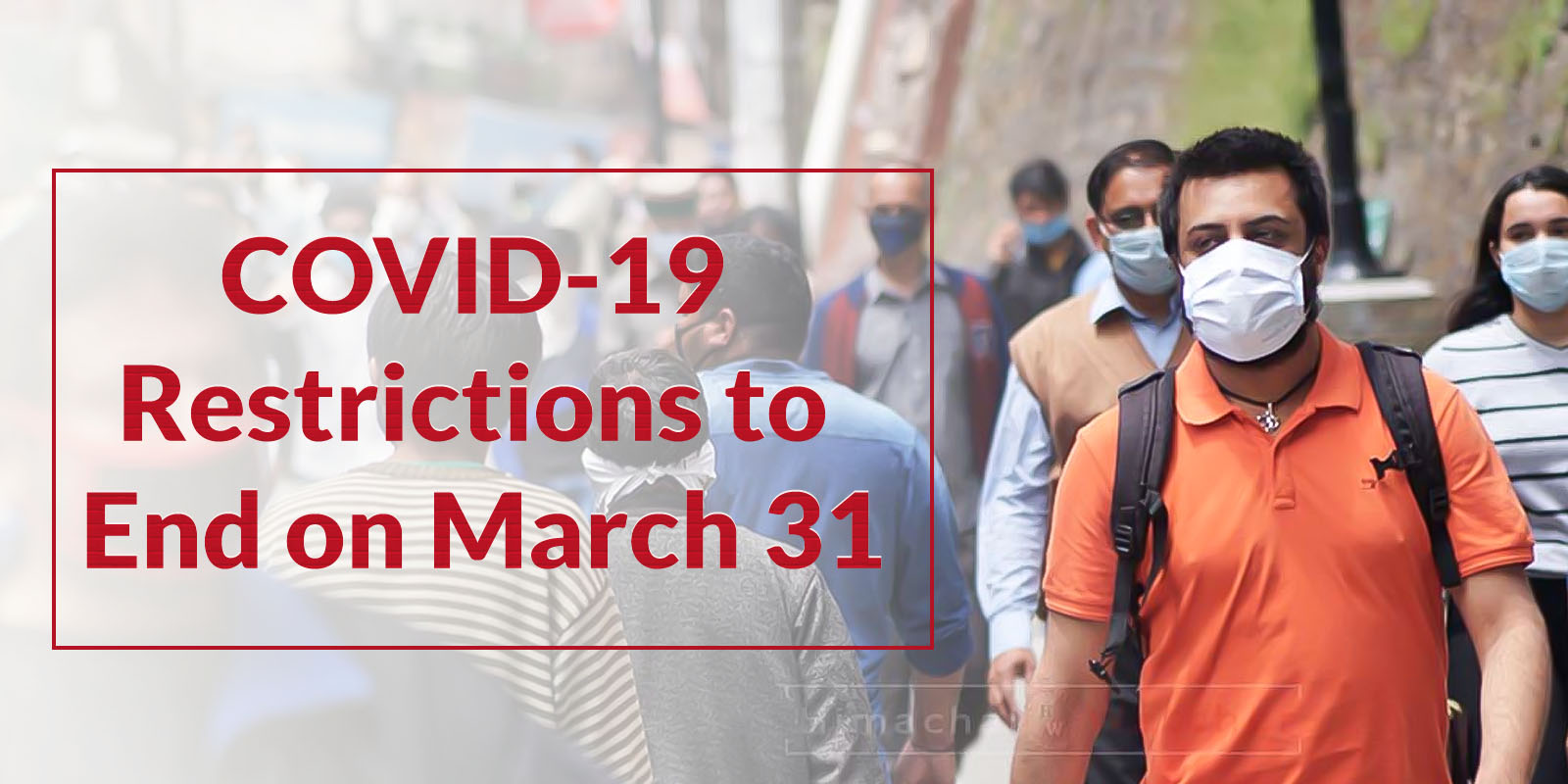
New Delhi-The Centre has issued a notification to the States informing that the provisions of the Disaster Management (DM) Act, 2005 will not be invoked in the country after March 31. The Union Health Ministry said that the use of face masks and following hand hygiene will continue.
It implies that most of the Covid-related rules and restrictions would end.
Union Home Secretary Ajay Bhalla issued the notification which said that the decision was taken following the overall improvement in the situation and the preparedness of the government in dealing with the COVID-19 pandemic.
However, local authorities and State police can still invoke fines and criminal cases against persons violating COVID-19 norms under the Indian Penal Code (IPC), a senior government official said.
The DM Act was invoked on March 24, 2020, due to the pandemic
“Over the last seven weeks or so there has been a steep decline in the number of cases. The total caseload in the country stands at 23,913 only and the daily positivity rate has declined to 0.28%. It is also worth mentioning that with the combined efforts, a total of 181.56 Cr vaccine doses have been administered,” the notification said.
“I would like to mention that in view of the nature of the disease, we still need to remain watchful of the situation. Wherever any surge in the number of cases is observed, the States/UTs may consider taking prompt and proactive action at a local level, as advised by MoHFW (Health Ministry) from time to time,” the notification said.
The Indian government had issued various guidelines and measures for the first time on March 24, 2020, under the Disaster Management Act to curb the COVID-19 situation in the country, which have been modified several times thereafter.
India currently has 23,087 active COVID-19 cases and recorded 1,778 new cases and 62 deaths in the last 24 hours. The daily positivity rate has also declined to 0.28%.
Nation
Vaccination of 15-18 Year Age Group in India from Jan 3, Precautionary Dose for Frontline Workers from Jan 10
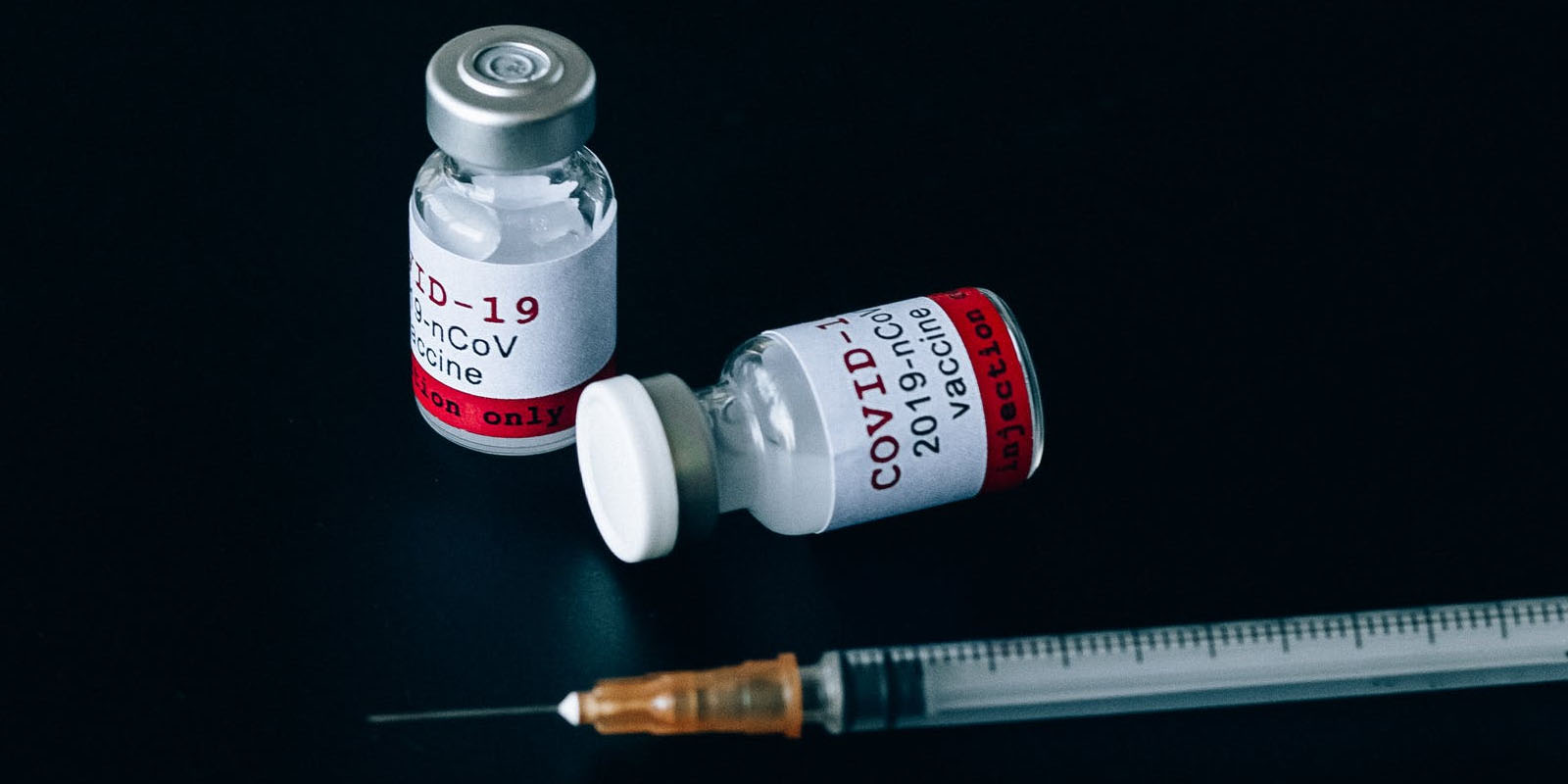
New Delhi-India will begin vaccination of the children in the age group of 15-18 years from 3rd January 2022. The move is likely to aid in education normalization in schools. The announcement was made by Prime Minister Narender Modi on Saturday evening. He also announced a precaution dose (booster dose) for healthcare and frontline workers from 10th January 2022, Monday.
In India, this has been called the ‘precaution dose’ not booster dose. An option of precaution dose will be available for senior citizens above 60 years of age with co-morbidities on the advice of their doctors from 10th January 2022.
Referring to the Omicron infections In India, the Prime Minister requested the people not to panic and to follow precautions such as masks and washing hands repeatedly.
According to the Government, the vaccination campaign started on 16th January this year has crossed the mark of 141 crore doses, and 61 percent of the adult population of the country has received both the vaccines and 90 percent of adults have received one dose.
According to the Government statistics, currently, the country has 18 lakh isolation beds, 5 lakh oxygen supported beds, 1 lakh 40 thousand ICU beds, 90 thousand ICU and Non-ICU beds especially for children, more than 3 thousand PSA oxygen plants, 4 lakh oxygen cylinders and support to states is being provided for buffer doses and testing.
The Prime Minister assured that soon the country will develop a nasal vaccine and the world’s first DNA vaccine.
Photo by Nataliya Vaitkevich from Pexels
Nation
Three Farm Laws to be Withdrawn, Announces PM Modi Ahead of Elections in Punjab and UP
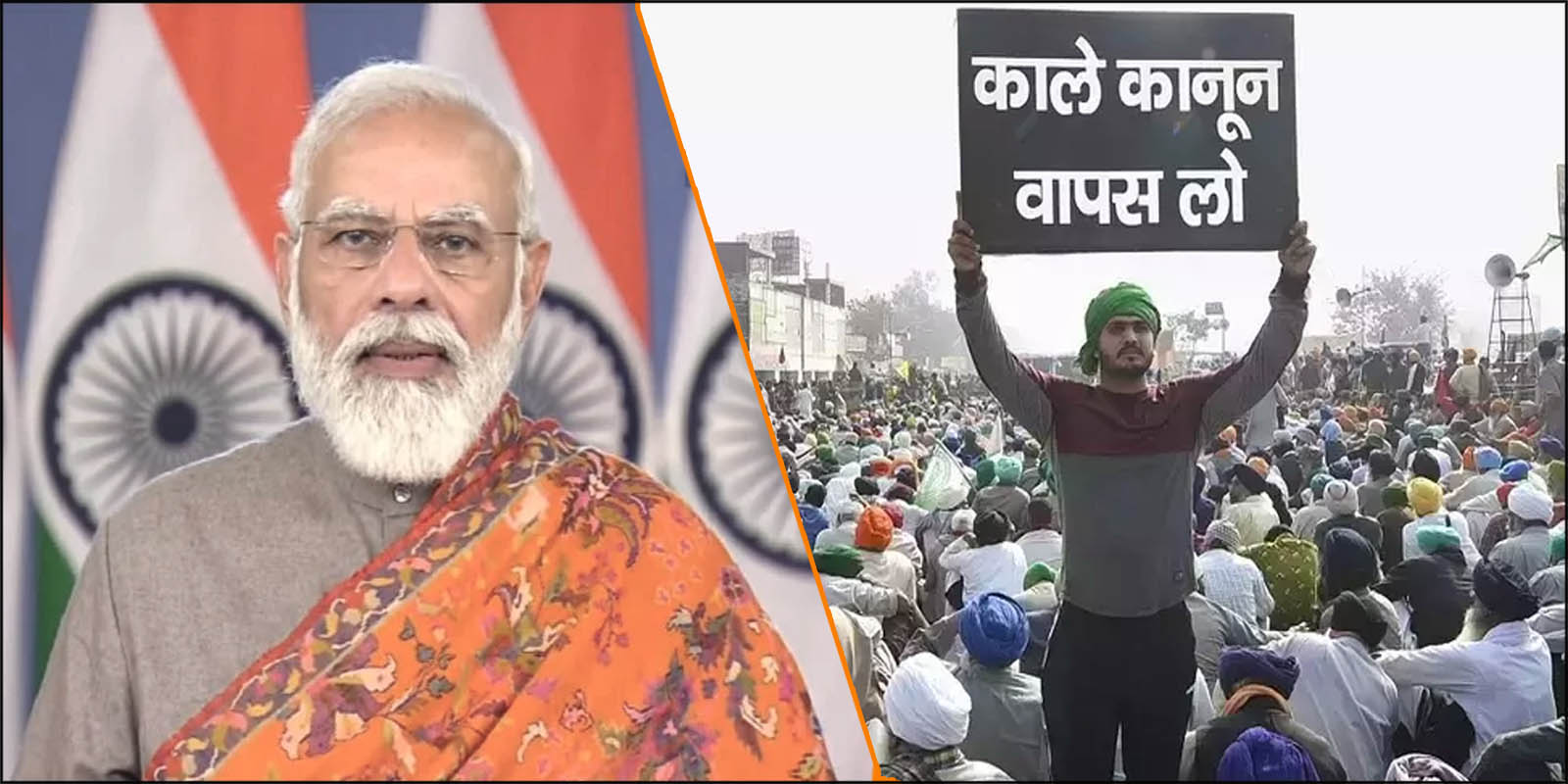
New Delhi: Ahead of assembly polls in Punjab and Uttar Pradesh, Prime Minister Narender Modi on Friday retreated from his stand on the three contentious farm laws and announced that the government will repeal three laws. He requested the protesting farmers to end the protest that has been going on for over a year now.
He said the three laws would be repealed in the winter session of Parliament starting later this month. He also said that though the laws were in the interest of the farmers, his government failed to convince them.
आज मैं आपको, पूरे देश को, ये बताने आया हूं कि हमने तीनों कृषि कानूनों को वापस लेने का निर्णय लिया है।
इस महीने के अंत में शुरू होने जा रहे संसद सत्र में, हम इन तीनों कृषि कानूनों को Repeal करने की संवैधानिक प्रक्रिया को पूरा कर देंगे: PM @narendramodi
— PMO India (@PMOIndia) November 19, 2021
The Prime Minister chose the occasion of Guru Nanak Jayanti to make this announcement. The decision is being perceived as an attempt to appease the farmers, especially in Punjab ahead of the assembly polls. Also, the results of by-poll held in various states are being seen as a setback to the ruling government that compelled it to reconsider its stand on the farm bills.
The Prime Minister said, “today I have come to tell you, the whole country, that we have decided to withdraw all three agricultural laws. In the Parliament session starting later this month, we will complete the constitutional process to repeal these three agricultural laws”.
It’s pertinent to mention that the Centre government had to announce a cut in taxes on petrol and diesel right after the results of bye polls were declared.
The three contentious bills are The Farmer’s Produce Trade and Commerce (Promotion and Facilitation) Bill, 2020, the Farmers (Empowerment and Protection) Agreement of Price Assurance and Farm Services Bill, 2020 and the Farmers’ Produce Trade and Commerce (Promotion and Facilitation) Bill.
The opposition Congress and farmers’ bodies have termed it a victory of their unity against the government’s decision. Former Chief Minister of Punjab, Captain Amarinder Singh was one of the first to welcome the decision through a Tweet.
Great news! Thankful to PM @narendramodi ji for acceding to the demands of every punjabi & repealing the 3 black laws on the pious occasion of #GuruNanakJayanti. I am sure the central govt will continue to work in tandem for the development of Kisani! #NoFarmers_NoFood @AmitShah
— Capt.Amarinder Singh (@capt_amarinder) November 19, 2021
यह जीत देश के किसानों की जीत है, लोकतंत्र की जीत है।
किसानों की जीत ने स्पष्ट कर दिया है- भारत में कभी तानाशाही हावी नहीं हो सकती, आखिर तानाशाह को झुकना पड़ा।#जीता_किसान_हारा_अभिमान pic.twitter.com/A9psOtBGq8
— Congress (@INCIndia) November 19, 2021


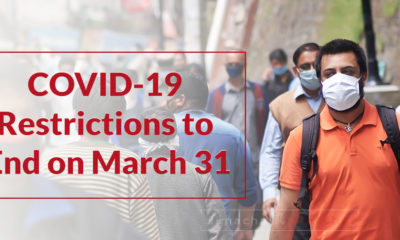

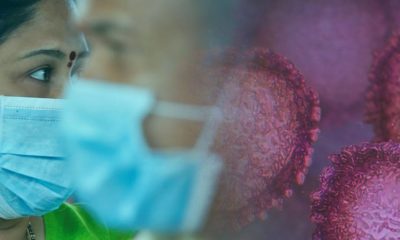

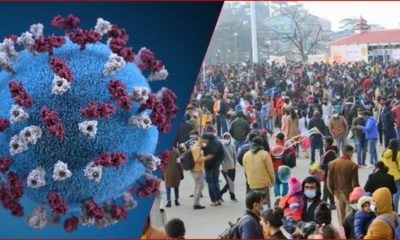







 Home Decor Ideas 2020
Home Decor Ideas 2020